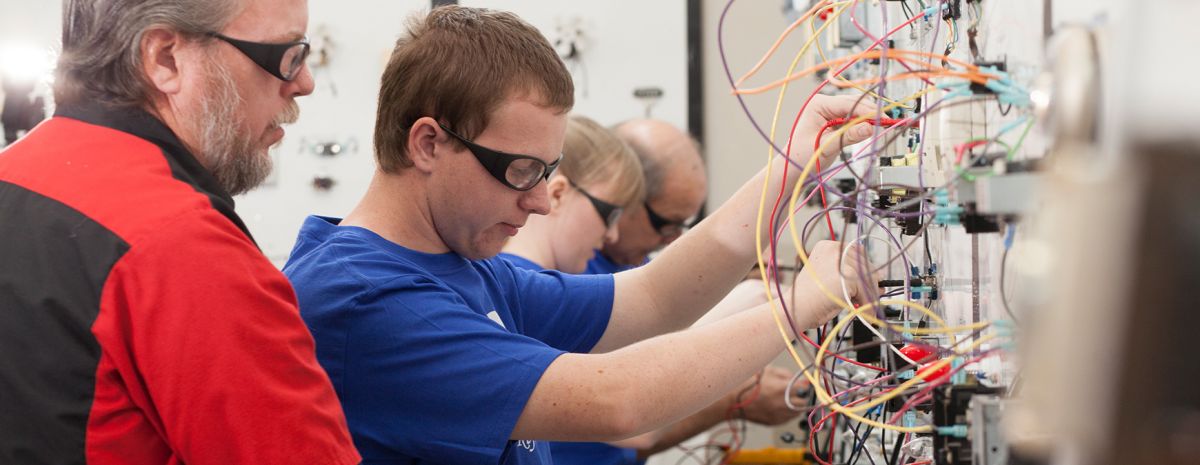
Despite holding a college degree, many graduates find themselves asking: what should I go back to school for?
For decades, college has been touted as the only reliable path towards a successful career.1 This is reflected in the steadily increasing rate of college enrollment that has been the norm since the 1960s. However, this trend shifted in 2011 and has yet to change.2
At the same time that universities and colleges are experiencing a decline in enrollment, many trade schools are attracting Gen Z students. Surprisingly, a good number of individuals attending technical training programs are already degree holders.1
Here, we’ll take a look at why college graduates are attending trade schools and the advantages of this educational and career path.
College Isn’t Living Up to Expectations
It’s been the popular opinion that getting a college education is the safest path to take after high school graduation. Every year, many high schoolers heed this advice without much consideration. Unfortunately, many are finding that college doesn’t guarantee career advantages.
Get Started on the Path to a New Career
Fill out our form to learn how we can help you change your life.
A report by the Federal Reserve Bank of New York indicated that 33.7% of all graduates held positions that didn’t even require a college degree in 2021.3
The uncertainty is even evident among those attending college. For example, the National Center for Education Statistics’ most recent data shows that 30% of students change their major at least once.4 The NCES also found that62% of students graduate after 6 years from all educational institutions. 5
Reasons College Grads Return to School
If you find yourself underemployed or unsatisfied with your job even after receiving a college degree, you might be wondering what to go back to school for. You’ve tried once before without the result you were promised, so what’s different this time around? Well, many college graduates are finding answers to these questions in trade schools.
Researchers with the Hechinger Report spoke with many college graduates who were returning to school but this time in technical and skilled trades programs to better understand their reasons. Some of the overarching themes mentioned by these returning students were that attending college in the first place was a matter of “going through the motions” and that not many alternatives were considered.1
Similarly, a StrataTech study hoping to find the underlying motivations for the growing trend of enrollment in trade school training programs surveyed people on their views of trade schools. The report found the two most important factors driving people to enroll or consider enrolling in a trade school are the opportunity to gain real-life work experience and the higher rate of job placement.6
Benefits of Trade School and Trades Careers
Improved Job Security
The COVID-19 pandemic resulted in an unprecedented and unforeseen spike in unemployment, putting many people in economically uncertain situations. The StrataTech survey indicated 57% of people who enrolled or considered enrolling in vocational programs said the pandemic was a motivating factor.6
Another 62% of respondents said they considered the trades after being forced to look for another source of income due to the pandemic.6 If job security and stable income are things to go back to school for, the skilled trades can be a viable option. Not only can fields like HVAC remain in-demand even during a pandemic, but they’re also the few fields that can even see growth during times of unpredictability.7
Growing Demand for Skilled Workers
Another major benefit of trade careers is the current shortage of skilled workers. The Manpower Group recently studied the labor shortages in the U.S. across industries and found that the most in-demand* position is that of a skilled tradesperson.8 The StrataTech survey revealed people are already taking advantage of this trend.6
In fact, 53% of respondents said that their main motivation for enrolling in a trades program was the higher rate of job placement.6 Another considerable perk offered by trade school programs can be a shorter transition time between education and employment because the training can last anywhere between a few months and two years.
Competitive Salaries
There’s a common misconception that a college degree is the only way to earn a competitive salary. In fact, 59% of high schoolers believe that a bachelor’s degree is necessary for landing a good job.6
However, digging into the numbers reveals something different: trade schools can prepare students for occupations with healthy earning potential:
- For example, HVAC/R mechanics and installers can earn a median annual salary of $50,590, with the top 10% earning more than $80,820, reports the Bureau of Labor Statistics (BLS).9 Keep in mind that HVAC pay can vary by state. **
- Similarly, welders can earn a median annual salary of $44,190, with the top 10% earning over $66,250, according to the BLS.10 **
- Electricians can earn a little higher than both groups, with a median annual income of $56,900 overall and $98,720 for the top 10% of earners, according to the BLS.11 **
When compared to the median annual salary of college graduates, which is around $67,860 for bachelor’s degree holders, it’s clear that trades careers can be competitive when it comes to income.12 **
What Are the Best Jobs to Go Back to School for?

Among college grads who are considering going back to school, many wonder: “how do I decide what to go back to school for?” If job security, an oftentimes faster transition to the workforce, and competitive pay are all high up on your list of priorities, then the trades might just be calling your name.
Based on these criteria, some blue-collar jobs in the trades for college grads to consider are HVAC/R technicians, electricians and welders. We’ve already discussed the income opportunities offered by these careers, so how do they rank when it comes to job outlook and transition to employment?
- Employment among HVAC/R mechanics and installers is expected to see a growth rate of 5% between 2020 and 2030, reports the BLS.13
- The welding sector is anticipated to see growth of 8% over the same time period, according to the BLS.14
- Electricians stand out with a BLS-projected growth of 9% in employment opportunities.15
While it takes four years to finish a standard bachelor’s degree, a vocational program can be completed in a fraction of the time. This can put you in the job market much quicker. Completing an HVAC training program, welder classes or electrician training can take anywhere from three months to under a year.
Should I Go Back to School in the Trades?
Is it worth going back to school? It depends on what you’re going back to study. Trade school can have a lot to offer college graduates who are looking for the practical skills that can prepare them for a specific career.
If you’re interested in getting started on your journey toward a career in the trades, reach out to The Refrigeration School to learn more about its trade school training programs. Call 866-820-0823.
Additional Sources
* According to BLS data through May 2020 (http://data.bls.gov/oes): Oklahoma employed 11,390 Welders, Cutters, Solderers, and Brazers (514121); Florida employed 13,510 Welders, Cutters, Solderers, and Brazers (514121); <33,210> Heating, Air Conditioning, and Refrigeration Mechanics and Installers (499021); and 38,860 Electricians (472111); Texas employed 48,940 Welders, Cutters, Solderers, and Brazers (514121); and 28,010 Heating, Air Conditioning, and Refrigeration Mechanics and Installers (499021).
**Tulsa area annual mean wage is $46,390, Jacksonville area annual mean wage is $42,910and Houston area annual mean wage is $51,260 for welders, cutters, solderers and brazers (514121)reported by BLS as of May 2020 http://data.bls.gov/oes. Average starting salary for Professional Welder is $35,863 for TWS Tulsa and $35,157 for Jacksonville for graduates employed during the 12 month period of 7/1/19-6/30/20. Average starting salary for Welding Specialist is $39,216 for TWSTC graduates employed during the 12 month period of 7/1/19-6/30/20. Average starting salary for Professional Welder with Pipefitting is $38,379 for TWS Jacksonville graduates employed during the 12 month period of 7/1/19-6/30/20. Average starting salary for Professional Welder with Pipefitting is $31,275 for TWS Tulsa graduates employed during the 12 month period of 7/1/19-6/30/20. Average starting salary for Welding Specialist with Pipefitting is $36,085 for TWSTC graduates employed during the 12 month period of 7/1/19-6/30/20.
1https://hechingerreport.org/more-people-with-bachelors-degrees-go-back-to-school-to-learn-skilled-trades/
2https://www.statista.com/statistics/183995/us-college-enrollment-and-projections-in-public-and-private-institutions/
3https://www.newyorkfed.org/research/college-labor-market/index.html#/underemployment
4https://nces.ed.gov/pubs2018/2018434.pdf
5https://nces.ed.gov/programs/digest/d19/tables/dt19_326.10.asp
6https://stratatech.com/wp-content/uploads/2021/10/Full-Results-StrataTech3.pdf
7https://www.businesswire.com/news/home/20210218005336/en/Skilled-Trade-Jobs-Are-Booming-in-Pandemic-Economy
8https://go.manpowergroup.com/hubfs/MPG_WhatWorkersWant_2020.pdf
9https://www.bls.gov/ooh/installation-maintenance-and-repair/heating-air-conditioning-and-refrigeration-mechanics-and-installers.htm#tab-5
10https://www.bls.gov/ooh/production/welders-cutters-solderers-and-brazers.htm#tab-5
11https://www.bls.gov/ooh/construction-and-extraction/electricians.htm#tab-5
12https://www.bls.gov/careeroutlook/2021/data-on-display/education-pays.htm
13https://www.bls.gov/ooh/installation-maintenance-and-repair/heating-air-conditioning-and-refrigeration-mechanics-and-installers.htm#tab-6
14https://www.bls.gov/ooh/production/welders-cutters-solderers-and-brazers.htm#tab-6
15https://www.bls.gov/ooh/construction-and-extraction/electricians.htm#tab-6
This blog has been labeled as archived as it may no longer contain the most up-to-date data. For a list of all current blog posts, please visit our blog homepage at https://www.rsi.edu/blog/

